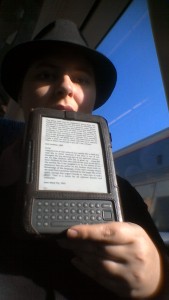The new year is coming and it’s a traditional time to reflect on how the previous year has been and look forward to the next one. It’s been a busy year, so as highlights I’ve picked out a few things I did for the first time in 2023. I’d also like to share some news about what’s coming in 2024.
Firsts of 2023
In the summer of 2023, I recorded Pause for Thought for BBC Radio 2 for the first time – I did a set of four in June, and they liked me enough to invite me back for another four in November and December. (You can still listen on BBC Sounds.) This has been a great opportunity to learn some new skills, like writing scripts which keep to the topic, the time, and fit a faith-themed insight in somehow, as well as a chance to share Quaker perspectives more widely. It’s also a challenge, both to come up with the material, and because the recordings are made after my bedtime to go out early in the morning!
In the autumn of 2023, I used Woodbrooke’s Quaker library in its new home for the first time. The move from the old Woodbrooke Centre to the University of Birmingham Cadbury Research Library is only one of lots of changes for Woodbrooke staff as the organisation moves away from the building and towards being a flexible, online and travelling Learning and Research team – you can read about other changes on Woodbrooke’s website. Most of the other changes in my work are in quantity not type, though. I always did travel around Britain to visit different Quaker meetings, and although I’ve done more in 2023, it doesn’t feel like a first. Similarly, running online courses is a lot of fun but it isn’t new any more. On the other hand, I knew there was a special collections library at the University of Birmingham, but I didn’t have a reason to use it until Woodbrooke’s collection moved there this year. It is different: calling up material from a catalogue rather than hunting on the shelves myself, and working in a dedicated reading room rather than borrowing books. It has advantages, though: I can email in advance and have something waiting for me, rather than searching and perhaps not finding, and the dedicated space pushes me to set aside dedicated time for research rather than trying to fit it in around other things. If you’d like to try this yourself, the Cadbury Research library is open to the public.
Also this autumn, I self-published a book start to finish for the first time. I’d done some of this before when I published Between Boat & Shore – it had previously been with Manifold Press, which closed, and I put it out myself. However, there was still a lot I hadn’t done: for Carving a New Shape, I also produced a paperback version, tried to announce the new publication in all the right places, and did some experiments with marketing, including joining in with group sales by sapphic authors (like the I Heart Sapphfic end of year 99p sale which will run from December 23rd to 28th 2023) and starting a TikTok account just for my sapphic prehistoric novels. It was fun, but it also became clear that I have more to learn! (Especially from people like Jae who have much more experience.) I’ve got an idea for the next novel and hope to self-publish again in due course – but 2024 will be more about nonfiction, I think.
Another less than completely successful project was displaying Angela’s archery medals. Having never been a Sport person, this was an entirely new thing for me. I managed some of it okay – put up a small shelf for trophies – but I chose a rail which glued to the wall for the medals, thinking, perhaps foolishly, that they aren’t that heavy and something designed for towels would be good enough. However, Angela went on to have a very successful season (see her archery Instagram for details) and the rail fell down one night! A goal for early 2024, once our Christmas decorations have come down, is to get a new rail with a stronger attachment and make sure we’re ready to celebrate any successes next season.
2024 news
A big change for me in 2024 is that right from the beginning of January, my work with Woodbrooke will increase from three days a week to four and a half days a week. We’re rearranging who does what a bit and there are some exciting new projects in the works. If you want to know what I’m teaching in the next few months, have a look at my Woodbrooke profile page.
I’m also expecting to have two Quaker books come out in 2024 – I’ll have more details over the next few months, but here’s a little taster. One is a Pendle Hill Pamphlet based on a lecture I gave in 2023, which talks about radical welcome and whether Quaker communities are ready to include people who will change us. The other is another Quaker Quick, with the working title Speaking in Quaker Meeting for Worship. It draws on my work on afterwords and vocal ministry to explore the current understanding of this practice in unprogrammed worship and try to answer common questions (which are often about when and how it goes wrong!).
This will also be a year of changes for Angela, too, as she finishes her PhD with all the challenges that involves – paperwork, the submission process, the viva, and the uncertainty that goes with that.
I plan to go on blogging sometimes in 2024, but if there are fewer posts, hopefully this helps explain why!





